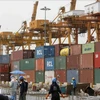
Bangkok (VNA) - Thailand’s major financial institutions are preparing for a difficult second half of 2024, as a struggling economy and high household debt force banks to take a more conservative approach to lending.
Kasikorn Bank (KBANK) has announced a more selective approach to lending, focusing on top-tier customers in low-risk categories to mitigate potential loan losses. While maintaining its overall lending target, the bank will closely monitor developments across various sectors.
Kiatnakin Phatra Bank (KKP) is also adopting a prudent stance, reducing exposure to riskier loan segments such as home loans, car loans, and hire purchase.
The bank has tightened lending criteria for mortgage applicants, with a particular focus on those seeking loans exceeding 5 million THB (140,000 USD).
Aphinant Klewpatinond, CEO of KKP, shared that while some segments have seen growth in the past, this is now declining and the bank needs to be more careful. KKP has therefore adjusted its growth target.
Bank of Ayudhya (Krungsri) has acknowledged increased risks across its loan portfolio, including the previously resilient large corporate segment. The prolonged economic slowdown and evolving business challenges have dampened the investment appetite of many companies.
Siam Commercial Bank (SCB) is prioritising risk management over growth, carefully selecting new customers and closely monitoring existing loan portfolios. The bank is aiming for double-digit return on equity (ROE) by focusing on lower-risk business segments.
Bangkok Bank (BBL) has maintained a cautious approach while supporting businesses with liquidity and investment opportunities. The bank expects to keep bad debt provisions at a high level in the second half of the year.
This collective tightening of lending practices by Thai banks reflects the financial sector’s response to increasing economic uncertainties and the need to safeguard against potential rises in non-performing loans. As the situation develops, it remains to be seen how these measures will impact Thailand’s broader economic recovery efforts./.






















